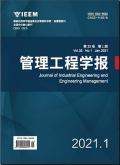管理工程学报2024,Vol.38Issue(4):209-221,13.DOI:10.13587/j.cnki.jieem.2024.04.014
供应链部分整合对再制造产品渠道策略的影响分析
The role of partial vertical integration in supply chain on sales channel strategy of remanufactured products
摘要
Abstract
With the intensification of environmental pollution and resource shortage,plenty of enterprises embark on their remanufacturing business,such as Mercedes,Audi,Dell,and so on.Although those enterprises can make profit from remanufactured business,the sales of remanufactured products may get them into trouble.In practice,some of the manufacturers like Caterpillar sell remanufactured products through an independent retailer,while some manufacturers,represented by Apple Inc.,prefer their own direct channel.When manufacturers decide to deploy their plans to sell remanufactured products,the question of which sale channel suits them most,as well as whether it can be capable enough to strengthen the cooperating relationships among supply chain members naturally comes to their mind. In many business practices,the upstream and downstream of the supply chain is no longer a simple supply and marketing relationship,and probably has a shareholding relationship,known as the partial integration of the supply chain.If the upstream enterprise owns partial shareholding of the downstream enterprise,it is called the partial forward integration(PFI)of the supply chain.If the downstream enterprise owns partial shareholding of the upstream enterprise,it is called the partial backward integration(PBI)of the supply chain.So,after envisaging those cases,we start to wonder whether the manufacturer's decision on the selection of sale channel of remanufactured products changes under PFI and PBI? In order to solve the above problems,we focus on a supply chain consisting of a manufacturer with his own channel and distribution channel respectively,and study the optimal channel strategies for remanufactured products in the case of no partial integration,PFI and PBI.Firstly,based on the consumer utility theory,we construct a differentiated pricing model for new and remanufactured products,after which two supply chain channel models(Model M and model R)are developed respectively in the case of no partial integration,PFI and PBI.Secondly,by comparing the wholesale price,sales price,quantity and profit of model M and model R lower than different,the optimal remanufactured product channel strategies of supply chain members are obtained.Then,we explore the optimal supply chain partial integration strategies by comparing the wholesale price,sales price,sales volume and profit of different supply chain integration models under a fixed channel strategy(Model M or model R).Finally,we discuss the impact of remanufactured product channel strategies on the environment,and reveal the mechanism of PFI and PBI. With the research steps above,we mainly summarize the following findings.First of all,on the one hand,in the case of PFI and no supply chain integration,selling remanufactured products by the direct channel is always the dominant strategy for manufacturer,but it is not as much as conducive to retailers,which results in a win-lose situation.On the other hand,under the PBI,selling remanufactured products by direct channel is not necessarily the dominant strategy for manufacturer,and three outcomes,win-lose,win-win,and lose-win,may appear depending on the proportion of shares the retailer holds.In the next place,when a manufacturer sells remanufactured products,PFI may create a win-win situation while PBI always creates a lose-win situation for the manufacturer and retailer.Last but not least,as far as the environmental impact is concerned,selling remanufactured products by manufacturer-owned channel is more eco-friendly than that by the retail channel.When a manufacturer sells remanufactured products directly,it is the most eco-friendly way without partially integrating the supply chain. The conclusion of this paper can provide guidance for enterprises when developing operational approaches regarding to producing and selling new products and remanufactured ones.1)Managers of manufacturing companies should obtain the insights that selling remanufactured products by retailers is not always a risk-free option.Saying in the case of PBI,with the premise that the ratio of retailers'shareholding is controllable below a calculated maximum value,it's better for manufacturers to choose their own channel,otherwise,the manufacturer should consider carefully giving up his own channel.2)Especially when there are fierce competitions between new and remanufactured products which implies that consumers hold a high valuation of remanufactured products,retailers should not exclude PFI even if PBI is more beneficial to themselves.Surprisingly,abandoning a small part of retailers'profits can actually optimize their own earnings and those of manufacturers which achieve a win-win situation.3)Retailers need to be aware that choosing manufacturer-owned channel does not always cause them economic losses.After a manufacturer enter into a PBI contract with a retailer,the retailer should support the manufacturer to sell remanufactured products through manufacturer-owned channel as long as the retailer's shareholding ratio is higher.关键词
再制造/供应链部分整合/直销渠道/分销渠道Key words
Remanufactured/Partial integration in supply chain/Direct sales channel/Distribution channel分类
管理科学引用本文复制引用
易余胤,周婷婷..供应链部分整合对再制造产品渠道策略的影响分析[J].管理工程学报,2024,38(4):209-221,13.基金项目
国家自然科学基金项目(71571086) (71571086)
广东省自然科学基金项目(2021A1515012002) The National Natural Science Foundation of China(71571086) (2021A1515012002)
The Natural Science Foundation of Guangdong Province(2021A1515012002) (2021A1515012002)

